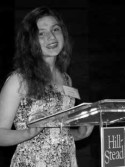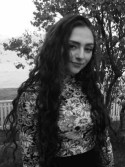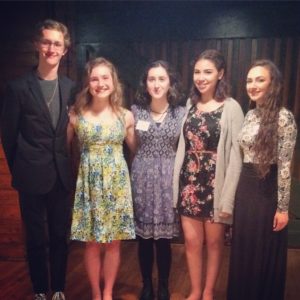 2016 Fresh Voices Poetry Competition Winners.
2016 Fresh Voices Poetry Competition Winners.
This year marks the 23rd season of the Fresh Voices Poetry Competition, a tradition established in 1993 by Young Writers Institute in conjunction with Hill-Stead Museum, and maintained thereafter by the museum. Fresh Voices is part of the museum’s ongoing commitment to promoting poetry and creative arts initiatives in schools across the state.
Each year up to five Connecticut high school students are selected to receive composition and performance mentoring from professional poets, as well as read before a large audience at the Sunken Garden Poetry Festival on Connecticut Young Poets Day – a highlight of Hill-Stead’s poetry season.
Congratulations to the winners of our 2016 competition. I’m certain you will enjoy the Sunken Garden debut of these talented students.
Susan Ballek
Executive Director & CEO Hill-Stead Museum
Student Poets: Send your entry in for this year’s competition before the March 17, 2017 deadline! For guidelines and an entry form, see Fresh Voices Poetry Competition.
2016 Winning Poets
- Owen Elphick, E.O. Smith High School
- Chloe Ezzo, Kingswood-Oxford School
- Leah Nashel, Westover School
- Jossary Padilla, Hartford Academy of the Arts
- Abbey Rose Popolizio, Haddam-Killingworth High School
2016 Fresh Voices Poetry Competition Winners
Owen Elphick, E.O. Smith High School
 Owen Elphick is a recent graduate of E.O. Smith High School in Storrs. He is an avid writer—of poetry, fiction, script (for stage and screen), and song lyrics—and has been featured in his school’s literary magazine, of which he was a staff member, as well as in several other publications. His time at the Center for Creative Youth in the summer of 2014 was very important to him, and he is grateful to several mentors including Denise Abercrombie, Pit Pinegar, Maureen O’Brien, and John L. Stanizzi. Owen has received a number of important honors, among them his selection as the 2015 Poetry Out Loud State Champion for Connecticut, in which capacity he competed in the 2015 National Competition in Washington, D.C., making it into the top nine in the nation. Other passions include theater, film, singing, beatboxing, philosophy, reading, and fencing. He has received awards for his acting from the Connecticut Drama Association and recently directed an original one-act play. This fall, Owen will be attending Emerson College, where he plans to continue to pursue writing and theatre.
Owen Elphick is a recent graduate of E.O. Smith High School in Storrs. He is an avid writer—of poetry, fiction, script (for stage and screen), and song lyrics—and has been featured in his school’s literary magazine, of which he was a staff member, as well as in several other publications. His time at the Center for Creative Youth in the summer of 2014 was very important to him, and he is grateful to several mentors including Denise Abercrombie, Pit Pinegar, Maureen O’Brien, and John L. Stanizzi. Owen has received a number of important honors, among them his selection as the 2015 Poetry Out Loud State Champion for Connecticut, in which capacity he competed in the 2015 National Competition in Washington, D.C., making it into the top nine in the nation. Other passions include theater, film, singing, beatboxing, philosophy, reading, and fencing. He has received awards for his acting from the Connecticut Drama Association and recently directed an original one-act play. This fall, Owen will be attending Emerson College, where he plans to continue to pursue writing and theatre.
राब्ता
I keep thinking
about that picture you
texted me, about that
word that will not leave me.
There is a
break in consciousness,
a spark in the senses,
when I say it—
raabta.
It echoes in the space
between us, stretching
across it, connecting us.
It is a
bridge, traversing our
ocean, built on nothing
but a few symbols
that spell us out,
and the sound of a word
that says everything—
raabta.
I search for its meaning, but
there is nothing in English sufficient
to capture and cage it; not
“relation”, not “contact”, not even
“inexplicable connection with another soul”,
no. We
are untranslatable,
we have no definition.
We just are—
raabta.
Under Repairs (State of the Union)
Washington, DC, 29 April 2015
I spotted it first
through trees green with springtime,
its terrible wonder backlit
by the early morning;
and then again, from across a busy
intersection, the white sun
now high in the sky, the shadows
gone, everything visible;
and then again, rising into my
sight line through the cherry
blossoms—pink and white
petals giving way
to stretched, plastic
sheeting, wound around
the base of the dome like a
skin-colored bandage,
to stretched, plastic
sheeting, wound around
the base of the dome like a
skin-colored bandage,
the bleached-bone white
of the walls and columns below,
the shining metallic silver of
the spider web scaffolding crisscrossing
across the entire top half
of the building’s skull,
cocooning it in construction,
and, of course,
the red, white, and blue of the flag
fluttering freely in the breeze—
so different
from the last time I saw it,
the smooth, solid purity replaced
by a support system indicative
of flaws needing to be fixed,
the facade stripped away
so as to see, to seal
the cracks beneath.
The Physics of Home
(inspired by Ekaterina Popova’s Summer’s Evening)
The closer I get
the less I like it.
There, I see
how it is made,
the illusion shattered,
the brush strokes visible,
the streaks of paint too
vivid, a mess of greens and blues,
pinks, whites, yellows, and browns,
inconsistent purples and lazy, in-
complete darkness,
simple, easy lines and one-
dimensional shapes, un-
formed items, images
too literal to be real,
not well drawn enough
until I step far
enough away.
Then, I long
to go to that place,
come into that room,
rifle through those drawers,
check that little plant, sit
at that table, finish that tiny cup of
tea as I stare outside at the explosion
of hedgerow, the blue sky, the
slowly dying light
of this summer’s evening,
slanting in through the
window, the emptiness
of this home and me
filled up by each other.
The further I am,
the more I want it.
Smarter
I used to think that being smart
meant what everyone told me
it meant.
I thought it meant
your hand hitting the air, Hermione Granger-style,
before anyone else’s
had time to consider ascent.
I thought it meant
knowing all the answers immediately
and not showing it if you didn’t,
raising your hand even
if you had nothing to say.
I thought it meant
reading like a speed demon, needing
the next book before others even
finished the first chapter of theirs.
I thought it meant
writing more than anyone else, fighting
only for yourself; solving complex equations,
memorizing the dates of invasions, and
prizing the grades I made with my wealth
of knowledge more than I did myself.
I thought it meant
Enrichment and AP classes,
straight-As and amazing grades,
stickers and stars, and not having
to try hard to get them, being automatically
ahead of everyone else in a great race,
having a quicker pace; never mind
I burned through pages and words
and numbers and thoughts
too fast to grasp their meaning,
to ask myself what I was seeing before it
shriveled away to ash in my mind.
I thought being smart
meant not needing to be kind.
I thought it meant
being blessed and cursed
in the best and worst possible way.
I thought it meant
being hated, picked on and teased
by the small-minded and weak,
those too stupid to matter,
pathetic fools just chattering,
pretending to not be jealous,
pretending to be better than they really were
and pretending that those who really were
better were worse.
I thought being smart
meant being better.
That was all I’d ever known.
I thought being smart
meant being alone.
And I thought that was okay,
because I thought being smart
meant you didn’t need anyone
anyway.
I used to think that being smart
meant what everyone told me
it meant.
I’m smarter now
than I was then.
Chloe Ezzo, Kingswood-Oxford School
 Chloe will be a senior at Kingswood Oxford School in West Hartford. She began to write poetry this past winter. She will be forever grateful to her English teacher, Mrs. Kasprak, who taught her to love poetry and encouraged her to write, and also to Ms. Schieffelin for her insightful suggestions and always being there to listen. Some of her favorite poets are Richard Wilbur and Robert Frost. She has always been an avid reader and enjoys writing short stories. Though she has a newfound appreciation for poetry, her first love is running. She plays the French horn in a wind ensemble group, and is also interested in math and French. She plans to continue refining her writing skills and mastery of language and is interested in experimenting with poetic structure and form.
Chloe will be a senior at Kingswood Oxford School in West Hartford. She began to write poetry this past winter. She will be forever grateful to her English teacher, Mrs. Kasprak, who taught her to love poetry and encouraged her to write, and also to Ms. Schieffelin for her insightful suggestions and always being there to listen. Some of her favorite poets are Richard Wilbur and Robert Frost. She has always been an avid reader and enjoys writing short stories. Though she has a newfound appreciation for poetry, her first love is running. She plays the French horn in a wind ensemble group, and is also interested in math and French. She plans to continue refining her writing skills and mastery of language and is interested in experimenting with poetic structure and form.
the tenth prayer
before morning on the tips of twisted tangents
the uncommon hour
where dewed ferns hum from below
trees, silhouettes of branches dark
against a pale paper sky
pensive wrens listen to the riddles
tucked between the black birches
though I no longer notice where they
lie in the thickets,
underneath sunken mist
so permanent, it coalesced in the slopes and ridges
longing stretched by the early chill
that almost bridges the other side
recalling the distance that had once
made us close in this place of entropy reversed
where the wind blows my earthly salt,
and the fading promises that linger still
running along the ground that we had
consecrated with our steps
Sound Advice
The echo of a thousand voices only makes
a great cacophony, and false songs
most of them will sing
in discord, rather than harmony,
fifty cents sharp or thirty cents flat,
never to be locking.
If only there was a sieve that
could sift out the impurities and
retain the gold.
And it’s worse still when these
murky counselors whisper from within,
calling up from deepest depths
to offer yet another glimpse
of the malleable internal portrait,
an unfinished work forever glossy
whose shifting features are imprinted differently
in every witness.
These contradictory vines tangle and bind
to the point of paralysis brought on
by a fevered mind insensible to light.
Instead they dwell in the uncertain penumbra,
unfit lodgment to say the least.
In turbulent times,
there is an inclination to turn to those
steeped in experience, and bend the ear
toward their sage advice, but too often
these are the same that will eagerly
provide the mold but lack the forbearance
to fill it with equal measure.
From such an encounter,
the torque of the turn will be compounded
until the motion becomes nothing but a
circular spin.
How can one be true to thine own self if
thine self be as formless as the vapors
composing the air? He may have wished
that this too, too solid flesh would melt.
He must have forgotten that we are liquid
on the inside.
where you’ll find me
awakening unmoored
wondering,
how it had drifted,
coming unstitched from my skin and
exiting as a finch
my violet soul, somewhere wandering
in a glass bottle on the subway, I knew,
looking for chrysanthemum summers
striped with jasmine tea and faraway sambas
other nameless things as well
made vibrant by the lull of monsoon rains
the memorization of singular minutes,
the meaning of seventeen
the hours blurred together.
as did everything else unraveling around me.
And then,
and then, I was saturated with involuntary realizations
and the abstract philosophies leaked,
my drippy thoughts . . .
those vintage reflections, distorted refractions
pooling at my ankles
the sky rocked back and forth.
tempest tossed and washed with its waves in wild, reckless,
torrents soaked by myopia and regret
feeling time whirl around me, rolling and unrolling
in acute awareness of its constant motion,
the dizzying beat of historical repetition
it didn’t matter that I’d evicted the man upstairs
for not paying his rent in seven months
a strong current swept me up and dragged me under
down
down
down
drowning, lost in the deep, in a sea of turbulent contemplation
only sure that they count you down from ten
despite myself, I wanted to grasp zero and peer through it
like a looking glass
to see that bleak nebular expanse beyond
if there was any truth in what the faithfully unfaithful had
always proclaimed
and if then I had heard the birdsong’s watery echo
that travels forward because there’s no going back
if then if then again and again
Talvit Verdi
remember me in your clarinet
in things sealed within the wrinkles of time
and in the crevices of yesterday
somehow I find myself denying all of the nevers
when I listen to you draw a breath and exhale arpeggios
or bibliophilic musings composed in inky tones
punctuated by interludes of lilting, magnetic silence
this rhapsody from meticulous penmanship,
moderato cantabile,
and just a bit legato
keep me, fold me between the variations of your cadenza
as a coloratura note, lyrical origami
for every shade of toska
Leah Nashel, Westover School
 Leah Nashel, who lives in Newtown, CT, is a recent graduate of Westover School. Several of her poems have been published in Westover’s literary magazine, The Lantern, along with some of her artwork. Her favorite roles at Westover School have been Antonio Salieri in Amadeus and Hamlet in Hamlet, which she also co-directed. Last summer she studied acting at the Stratford Shakespeare Festival in Ontario,
Leah Nashel, who lives in Newtown, CT, is a recent graduate of Westover School. Several of her poems have been published in Westover’s literary magazine, The Lantern, along with some of her artwork. Her favorite roles at Westover School have been Antonio Salieri in Amadeus and Hamlet in Hamlet, which she also co-directed. Last summer she studied acting at the Stratford Shakespeare Festival in Ontario,
Canada. She will be attending the National Theater Institute this fall before joining the Mid-Year Class of 2020 at Brandeis
University, where she plans to pursue her interests in acting, writing, studio art, and vocal performance.
Child’s Play
So I can’t give her away,
my Barbie doll,
or let my mother see.
She has a dull pink stain
between her thighs,
faded pigment
of a brown Crayola marker
that wouldn’t wash away.
In vain I scrubbed the color
that had pulsed from my marker’s tip
as nipple-less, bow-armed,
her body received it,
pink to complete each breast,
brown to cloak the triangle:
the lady-parts plastic, manicured,
perpetually clean-shaven,
now almost soft,
sweaty almost, like my hands
before they chilled stiff and I tried
to wash away the deed,
shoulders tensed in case
the bathroom door flew open —
“Honey, time for dinner.
What are you doing
with that Barbie in the sink?” —
the soap suds turning brown and blush,
rusty drops rolling
off plastic thighs,
catching in the indent
of her belly button,
leaving traces of desire
on imitation flesh.
Cancelled Soliloquy from Hamlet
Flowers bleed transparent on my skin,
Innocents killed by seeming innocence
And swaddled into garlands where thin necks
Choke in knots supporting maiden heads.
I know for certain now that I am no one,
At least that I have nothing left to say:
My words are spent that never once had worth,
Breathed out, cast off to thud at noble heels
That face me: eyes, minds, faces look away
From my unkempt decline, my piteous shrieks,
Not knowing ’tis through madness that I speak,
And though undone I am not yet unthinking.
A blossom flailing on the rank wind’s breath,
I’ve caked my fragile shape in river mud,
Soiling virtue with still-virtuous hands
Designed for gentle work like strangling stems.
I wove a blooming circlet for my head
Whose blossoms now wilt slowly in the sun,
Rough pendant tongues of leaves that graze my brow
And petals drying auburn at the tips
As I will never dry, not if I let
This rashness seize me, lead me towards the cold,
Towards water still as unremembered dreams
Where, calm at last, I can be free and leave
This bitter, biting world, this heavy air,
The castle walls that shut me into silence
Even from afar. But how to go?
Shall I, in slipping, by some misplaced step,
By one foot tangled in the muddy ghost
Of skirt that drops disheveled from this bodice
Whose bones I snapped, one toe that slides too far
Across this bank, fall swift into the brook
And there thrash fit-like till the terror leaves
My limbs, and I float limp like wreaths of violets
And tangled wisps of rue that crown my head?
Remember me, I want to say. Recall
The springtime sister, laughing sunlit daughter,
Who skipped at your heels and smiled and obeyed.
Look how my pain, once masked, has sent me whirling,
Unlacing in a rage my throbbing wrists
To bloody cheeks of rue and fennel necks.
Garlands of song wrap words I cannot breathe
Until at last, drowned laced with flowers, I leave.
Time Well Spent
The lawn is strewn as if someone
has shattered a glass vase;
shards of orange, crimson,
and browning yellow,
green sprigs encroaching
for contrast.
She lies, hair sprawling, on the leaves,
(some nature goddess),
mouse-brown coils torched
by ember flames as she stares,
smize-ing , at the azure drape
so sun blanches her skin
and she needs #nofilter.
Still, for focus, in the rustling breeze,
as Lizzie taps the screen
to trap the warm, belonging,
perfect instant,
the #obligatoryfallphoto,
proof of glossy fun,
like October after school
at Hadley Elementary,
tossing tornadoes of leaves
that spiraled around them,
too swift for pixels,
@eva_b
@lizjordan98,
cold hands burn-tingling inside,
clutching Swiss Miss
in jack-o’lantern mugs.
#fall
Aunt Denise
Dandelions rippling through the green
remind me I should remember more
than their flashes of life upon the breeze-swept hill
where grey rocks rose to receive
bouquets of finer flowers.
I can’t recall her flowing through pirouettes,
but I remember the crunch of the stem
between my three-year-old fingers
as I laid a splash of yellow at the feet
of a dancer trapped beneath her name
in a graven arabesque, mocking listless limbs
that wither out of reach of dandelion roots.
She was a blur of raspberry lipgloss and wispy brown hair
who squealed “tickle time” as she squashed my cheek
against the scratchy futon, giggling when I struggled to breathe,
wishing she would turn to empty air.
The man who spoke beside the stone said we would hear
her voice in the breeze, but I didn’t believe him;
she was just a glimpse of white teeth caught in photographs;
a black handbag wrapped in cool, metal sequins
that I poured against my palms;
a swirl of tangled silver in a jewelry box
my mother keeps closed;
a cluttered shelf of cheap, porcelain angels.
She was the reason people slumped on my grandmother’s couches,
their faces tear-splashed or tense, flushed or stone,
while I licked the red jelly from the heart
of a bland, flower-shaped cookie and wondered
why no one was happy.
Haunting
In smiling, living faces I see them,
trying to smile behind barbed wire
that pierces ashen sky. The family room
turns skeletal; our pasts, our shadows, limp
in soiled, striped fabric towards thin barrack walls
that never held our breaths, our lice, our sores.
I do not know horror; I know haunting,
the aging shades of faded photographs
that form a world of nightmare monochrome.
Coils of hair, a girl with hollow eyes,
a web of graying limbs. Words are too weak,
too shifting to describe the heaviness
of thinning families, of empty dark,
of pain we shiver with, but cannot feel.
Jossary Padilla, Hartford Academy of the Arts
 Jossary Padilla is a creative writing senior at the Greater Hartford Academy of the Arts. Her long-term goals are to become a professional makeup artist, as well as publish several books of poetry and essays. Her work is inspired by the candidness and thematic values of Sharon Olds, Sylvia Plath, Anne Sexton, and Lucille Clifton. She was the 2015 recipient of the Wallace Stevens Friends & Enemies poetry scholarship and was published in the winter issue of the Teenage Wasteland Review. Her other interests include fashion design, sociology, and massage therapy.
Jossary Padilla is a creative writing senior at the Greater Hartford Academy of the Arts. Her long-term goals are to become a professional makeup artist, as well as publish several books of poetry and essays. Her work is inspired by the candidness and thematic values of Sharon Olds, Sylvia Plath, Anne Sexton, and Lucille Clifton. She was the 2015 recipient of the Wallace Stevens Friends & Enemies poetry scholarship and was published in the winter issue of the Teenage Wasteland Review. Her other interests include fashion design, sociology, and massage therapy.
Mama
when I watch you wrapped in veils
kneeling , surrounded by bibles
and bottles of olive oil
or when I watch the bags
under your eyes darken
as you spend your nights
mumbling prayers
and hissing pleas for forgiveness,
I can only hope
that you find the love
you desperately crave,
even if you find it
in cupped hands
that hold nothing but
disregard for you.
Ocean Baptism
The thick, warm water
Trails over my face, clogging my pores
With salt and specks of sunlight.
I’m scared of the sting of open eyes,
But I don’t want to be left blind beneath the surface.
Swaying my fingers,
I watch the water distort
And I see his face.
His brown eyes rival the darkness around him,
Unblinking, unwavering.
My body becomes heavier,
The water tugs at my bones,
Pulling me towards the ocean floor.
He sinks with me.
His translucent hands float above him,
Pale palms facing upwards.
The distance between us
Shrinks; his lifeless limbs,
Which once warmed my cold fingers,
Now cause me to shudder.
The abyss solidifies
Into ice,
And our bodies become stuck
Like insects frozen in amber.
I want to bear no scars of
Loss of childhood or misplaced faith.
I want the salt that seeps into my skin
To cleanse me of nights
Spent mourning the secrets
That died with him.
Bathtub Baptism
The bathroom ceiling ruptured;
Cold drops of water and clumps of plaster
Fell onto my bare shoulders. They traveled
Down my back
To my hips
That used to proudly display bruises
He left behind.
My scarred knees were raw,
Aching from the tub of cloudy, boiling water.
I swore I saw his hands reach out from
Beneath the surface and spread my legs apart.
I submerged my body until my eyelashes
Floated
Like dark seaweed. The water burned my lips
And I was reminded of his teeth trying
Their hardest to draw blood.
It was safe there,
Where my joints only groaned
About the small tub
And not a stiff mattress.
The smell of molding drywall
Covered the aftertaste of his Chapstick
And I counted the seconds before
I needed to breathe.
The burn in my throat
Fought with the tightness in my
Chest. I heard his voice and it
Sliced
Through me.
My hands instinctively
Went for my neck,
Half-expecting to feel his bony fingers.
My body shot up to the cold air
Of the bathroom. A drop of water
Fell onto my head
And I watched his hands disappear
As I took a breath.
The Hanging Man
I thought bathwater would cleanse me of your staining touch.
Instead, I drowned and saw your hands dive for my neck.
The moonlight gave birth to infinite black holes in your chest –
We were in a planetarium when you said you felt nothing.
There’s something beautiful about a tree reaching towards
the constellations,
But there are no clusters of stars that hang like fruit.
In your incessant gaze, I grew limp like an uprooted weed
Underneath a sky of woven flowers that resembled your face.
Abbey Rose Popolizio, Haddam-Killingworth High School
 Abbey Rose Popolizio will enter her senior year at Haddam-Killingworth High School, where she studies creative writing with her teacher, mentor, and inspiration, Jaime Allesandrine. Earlier, she was home-schooled in order to dance full-time in a pre-professional ballet company. During this time she discovered her passion and talent for writing, using her dedication and unique experiences as a dancer to fuel her works. One of her chief inspirations is the poetry of her favorite writer, Kim Addonizio. Some of Abbey’s work has been published in Haddam-Killing worth’s literary magazine, Reflections, along with various selections of her award-winning photographs and artwork. She is also on the H-K girls’ lacrosse team and attends aerial silk classes during the off-season. Abbey Rose hopes to have a career in writing or art.
Abbey Rose Popolizio will enter her senior year at Haddam-Killingworth High School, where she studies creative writing with her teacher, mentor, and inspiration, Jaime Allesandrine. Earlier, she was home-schooled in order to dance full-time in a pre-professional ballet company. During this time she discovered her passion and talent for writing, using her dedication and unique experiences as a dancer to fuel her works. One of her chief inspirations is the poetry of her favorite writer, Kim Addonizio. Some of Abbey’s work has been published in Haddam-Killing worth’s literary magazine, Reflections, along with various selections of her award-winning photographs and artwork. She is also on the H-K girls’ lacrosse team and attends aerial silk classes during the off-season. Abbey Rose hopes to have a career in writing or art.
Brooklyn #4
I have known the grit of city skin,
scratching my thighs on the green line,
trapping scabbed over sin
under my plastic nails.
Nostalgia drips from my drugstore lips
and the names of all the strangers I’ve met
burn a hole in my throat.
I try to scream.
Ashes smoldering with lies
fall from my mouth.
The man sitting next to me sees,
he gets off at 6th street.
Am I in Coney Island now?
Fizzling pastel neon and jarring screams
I lust the innocence around me, dirty sand in my teeth,
vanilla ice cream clouds my eyes,
these sweet summer cataracts blind me.
But I can still see the skin of my thighs,
calloused with the picked scars of sin
begging to be picked
again and again
until I can see my blood
turn to bone.
It’s too late to go back.
I will never go back.
Ode to the Lens of the Invisible
I want to photograph the things you do not see.
I want to photograph that old Russian man
on the six train
mumbling over a red rosary and muttering on about
the Motherland.
I want to photograph the calloused hands
of a terrorist.
I want to photograph your chapped lips,
kissing the heads of martyrs,
kissing the tips of snipers,
all in black and white.
I want to photograph the breath
in your chest that is tainted
with the acid burn of acrid air.
I want to photograph the stains
that are left between unspoken words
and the memories that beg to be forgotten.
I want to photograph your eyes
through the reflection of a butcher’s knife.
I want to photograph the sighs,
that leave the lips of a woman
who is shrouded in black and
oppressed by the scent
of turmeric and curry.
I want to photograph how it feels
to scar your skin
with the names of forgotten lovers
and how whenever I hear
your name,
my tongue turns to that of a cat’s
prickled and dry,
with a thirst that only
you can quench.
All with 35mm film.
I want to photograph the blackness in your soul,
that bleeds your blood, and runs
your veins violet
like the cracked leather that adorns your back
everywhere you go
from opium dens, fairy floss dreams,
and vanishing carnival shows,
all with my mother’s forgotten polaroid
the one that ran out of ink
and prints everything that
you do not see.
The Great
When Night fell,
she fell hard.
And her bones shattered on deserted sidewalks,
scattering fragments of milky remains across empty streets,
once cloaked in the rusty blood of the tired moon.
When she fell again
her ivory skin frayed, and her seams began to tear
manifesting in a mess of torn flesh
and cemented limbs, enshrouding the Earth
in the quilt of her carcass, binding the seas
with her calloused palms, and housing the mountains
within her vacant chest.
But the next time Night fell
she got entangled in the deception of day,
where the dust of broken butterfly wings made a home
beneath her Andromeda eyes, shimmering under glints
of the after hour sun, and becoming undone
in the long shadows of dawn.
Then she started to gamble with the morning sky,
placing her bets on the sheep of the slaughter, and harboring
the wool
of skinned purity between a burning hand and folded cards.
But she forgot that her lips spoke the language of the stars,
and the tired moon called her bluff before she could sing
to the swallows of the rising sun.
Then, when morning prevailed her odds, Night leapt for the Earth,
her shattered bones grasping the leathered skin
that was smeared beneath broken skies,
and the oceans she held in her blistered palms began to swallow
the mountains that she kept in her chest.
And as the sun sang a lullaby to the cricket queens of
dangerous woods,
the Earth, with sheers of fire, spliced the ribs of Night
letting her fall into the souls of those
who made Night their home.
The Numbers
How many summers have passed where my skin stays pale,
and the dreams from the night before
collide with reality?
How many summers were blurred by the thought of things
changing, how many staying the same
only you know
how many men I’ve kissed, how many truths or lies,
how fast the earth shatters screaming to the deaf and begging
to be put back together
within the sting of a bee.
I don’t know how you can just sit there and watch as she falls
to the ground piece by piece
and begs the Saints to tell her
how many hours have passed.
I want to taste your bitter lies and sit on the fire escape as
God groans and cries.
I want to count his tears
but only you know I want to drink them.
I don’t want to guess how many bars you’ve sat in reeking of
cheap cognac and stale cigarettes.
I want to taste it, like your lies, and lie under bridges staying
silent. Counting your breaths, and
watching your chest
rise with the moon.
How many breaths left—how often have I asked that
how often have you answered. The under the underpass, damp
and dark, struggling tangerine street lights and dreams. Here,
I can’t help but hear your muttering whispers over knuckles
bruised blue from love, and fingers that danced on my velveteen
neck and grasped the gown of God. Intertwine yours with
mine. Drag me to hell, where the saints catch fire, if that means
I can hold your hand without a grip.
Fall on your knees,
fall to my feet.
lay down an offering sweeter than wine.
How many prayers
have you left at my altar,
How many summers
will it take for me to answer them?

 2016 Fresh Voices Poetry Competition Winners.
2016 Fresh Voices Poetry Competition Winners.